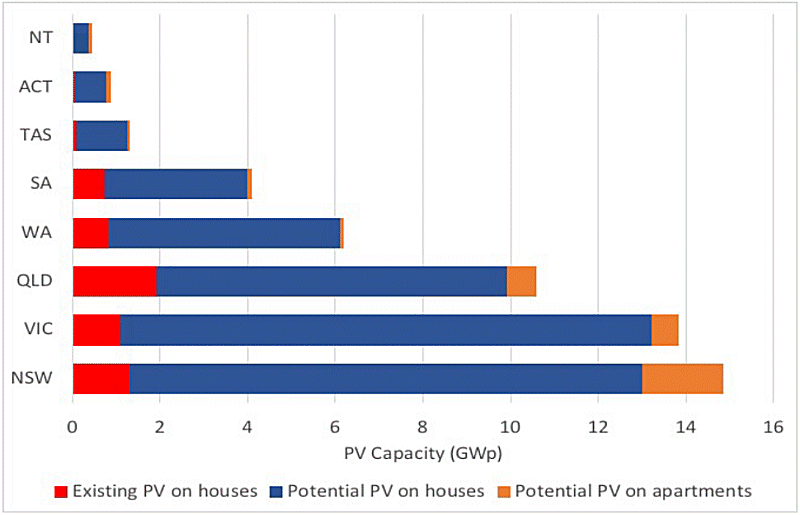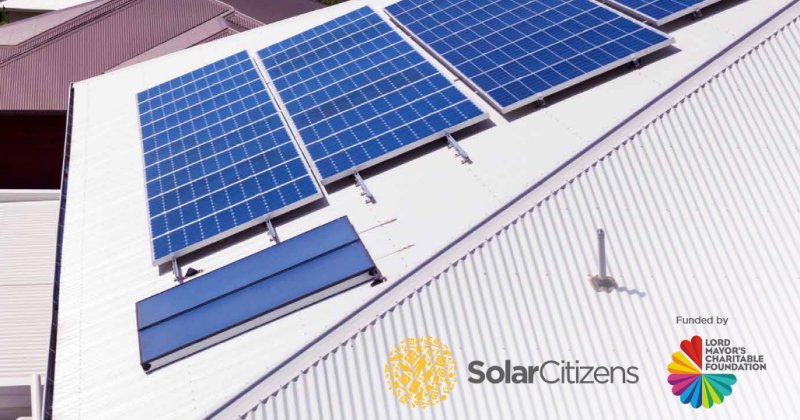Australian grassroots solar advocacy group Solar Citizens says while 6GW of solar capacity is currently installed on residential rooftops throughout Australia, there’s potential for much, much more.
Distributed solar energy in Australia is generating 8,900GWh of electricity per year – and that figure is growing. It’s more than what is generated by the coal fired clunker Liddell Power Station. And unlike Liddell, PV systems installed on homes and businesses across the country are making a significant contribution towards emissions reductions; an estimated 7.4 million tonnes of carbon dioxide equivalent annually. Other benefits of small-scale solar include reining in of wholesale electricity prices and an industry that supports thousands of jobs.
There are still many naked and underutilised rooftops across the country that could be providing more of the benefits distributed PV generation brings, while saving those living below them a bundle of bucks on their electricity bills.
Based on a report by the University of NSW and Australian PV Institute prepared for the organisation, Solar Citizens states there is enough suitable residential rooftop space in Australia to host 43GW to 61GW of solar power capacity.
While various forms of assistance are available for Australians to install solar panels, the group says more could be done – particularly for those in the community often excluded from taking advantage of existing support.
Apartment Dwellers Missing Out On Solar Benefits
A section of the community for which significant hurdles remain are apartment building dwellers.
“The report identified that the lion’s share of this PV potential—93.5%—is on stand-alone houses, but up to 4GW is on apartment buildings,” says National Director Joseph Scales. “To unlock all this potential there’s still work to do to help low-income households, renters and people living in apartments get access to solar.”

UNSW/APVI
Solar Citizens’ recommendations for helping these groups to access solar power:
- Directly fund the installation of solar panels on public and community housing stock.
- Provide rebates and no-interest loans to support low-income and vulnerable households in accessing the technology
- Implement schemes incentivising PV on rental properties and enable landlords and tenants to split the benefits.
- Offer small grants, rebates, low-interest or no-interest loans to body corporates to go towards installations on apartment buildings
- Reduce unnecessary red tape apartment residents face in sharing solar energy via embedded networks.
- Introduce electricity network tariff reform that enables households to sell surplus electricity generated to neighbours.
- Support solar gardens (i.e. community PV).
Making Solar Access An Important Federal Election Issue
Some of the above is already happening to a degree, but it’s piecemeal and mainly at a state level. For example, Queensland has a public housing PV trial in progress and Victoria’s government has pledged a solar for renters initiative as well as interest free loans under its Solar Homes Package scheme (interest-free loans from July 2019).
Solar Citizens is using the upcoming federal election to turn the pressure up on political parties to present strong renewable energy policies relating to these issues.
“With the federal election approaching next year, now is the time to demonstrate to all sides of the political spectrum that incentives that help more people get solar and storage are popular in the community,” says Mr. Scales.
A summary of the group’s Australian Rooftop Real Estate report (Part 1) can be accessed here (PDF). The related report on which it is based, prepared by the APVI and UNSW, can be downloaded here (PDF).


 RSS - Posts
RSS - Posts



Speak Your Mind